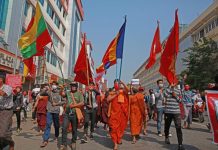
Sindh, the second largest province in Pakistan, has imposed a three-hour curfew to stop people from attending Friday congregational prayers.
Having the largest urban population in Pakistan, Sindh implemented a curfew-like lockdown from 1200H to 1500H to prevent people from attending Friday congregational prayers.
Despite warnings from the government, numerous people went to mosques to pray last Friday. Currently, Pakistan has the most number of coronavirus cases in South Asia.
In several Muslim nations, it is the men's religious obligation to attend Friday prayers while women, children, the sick or disabled are not obliged. At the mosques, they often use communal prayer mats, shake hands and pray in close proximity.
Over a week ago, the province already announced a lockdown but Pakistan's Prime Minister Imran Khan had publicly opposed the measure, saying it would cause people to die of hunger.
The new curfew will be used to shut down all movement during the Friday prayer hours and for all markets to close completely during this period. This is different from the normal lockdown which permits necessary movements and essential services to continue.
While general attendance at mosques has declined dramatically due to fear of infection from the coronavirus, an order to limit attendance at mosques to a maximum of five persons, including the prayer leader was largely ignored.
Moreover, there is pressure for the government to come up with initiatives beyond restriction of public gatherings as the numbers of people testing positive to Covid-19 continue to increase.
Latest reports have indicated that in Pakistan, there are at least 2,450 coronavirus infected people, of which 783 cases come from the province of Sindh. In just five days, the number of cases in the province's largest city, Hyderabad, went up from four to 130.
Tablighi Jamaat convention
A large number of these cases were members of an Islamic missionary movement called Tablighi Jamaat, who had returned after attending the Jamaat's annual convention in Lahore in mid-March.
The event was attended by missionaries from various Islamic countries and it was deemed to be a catalyst for the spread of the virus to many areas in Punjab, in some sectors of the federal capital Islamabad, as well as to other areas like the Palestinian territories.
While the federal government appeared to have backed down from the issue, provincial authorities have pushed through with the implementation of partial lockdowns in their respective jurisdictions.
Some reports have shown that curfew-like restrictions such as in Sindh have resulted in restriction of movement and reduction of attendance in mosques.
In Islamabad, mosque loudspeakers blasted with announcements urging people not to come to the mosque and to pray at home as the time for Friday prayers approaches.
However, people in rural areas are expected to attending the usual Friday congregations but their numbers may decline.
For the Muslims in Pakistan, Friday prayers are perceived more as a social habit rather than a religious obligation. This means that many will find it hard to shake it off unless they recognize the danger they are facing.






